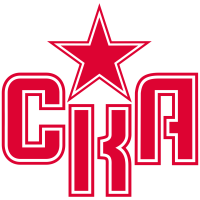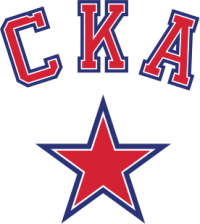SKA Saint Petersburg
 | |
| Full name | Sports Club of the Army |
|---|---|
| Nickname(s) | Soldiers, Horses |
| Founded | 1946 |
| Based In | Saint Petersburg, Russia |
| Arena |
SKA Arena (Capacity: 21,500) |
| League | Kontinental Hockey League |
| Division | Bobrov |
| Conference | Western |
| Team Colors | |
| Owner(s) | Gazprom Export |
| Affiliates |
SKA-Neva (VHL) SKA-1946 (MHL) SKA-Yunior Krasnogorsk (MHL) Khors-Kareliya Kondopoga (MHL) |
| Website | www.ska.ru |
main
The Hockey Club SKA (Russian: Хоккейный клуб СКА), often referred to as SKA Saint Petersburg and literally as the Sports Club of the Army, is a Russian professional ice hockey club based in Saint Petersburg. They are members of the Bobrov Division in the Kontinental Hockey League (KHL). The club never competed in a league final until the 2014–15 KHL season, where they defeated Ak Bars Kazan winning the Gagarin Cup. They won their second Gagarin Cup in 2017, defeating Metallurg Magnitogorsk. In 2012, with an average of 10,126 spectators, the SKA became the first Russian club ever to average a five-digit attendance.[1]
SKA is owned by Russian state-controlled energy giant Gazprom. The club used its immense wealth to gather almost all elite Russian KHL players under its umbrella to prepare them for the 2018 Winter Olympics. The success of Russian team in winning gold at the first Olympics since 1994 that did not feature any active NHL players were attributed to players' chemistry developed in SKA.[2]
In 2023, Roman Rotenberg, the General Manager of the Russian team, thanked Russian state-owned Gazprom for their contribution to Russia's victory at the 2018 Winter Olympics.[3]
History
The club was established in 1946 as a top level club of the Soviet Hockey Championship to participate in its first season. The original name the club was Kirov LDO (Kirov Leningrad Officers’ Club). It was subsequently changed to ODO (District Officers' Club) in 1953, SKVO (Sports Club of the Military District) in 1957 and finally Sportivnyi Klub Armii (Sport Club of the Army) in 1959. During the Soviet era the SKA (along with CSKA Moscow) belonged to the Ministry of Defense sports club system and consisted of Leningrad Military District officers.
After finishing last in their group during the first season LDO skipped the next season and was downgraded to the second level of the championship in 1948. The club returned to the Soviet Class A in 1950–51 and remained in the top division of the Soviet league until 1991. The highest achievements of the club during that time were 1968 and 1971 Soviet Cup Finals (the former was lost to CSKA Moscow 7–1, the latter to Spartak Moscow 5–1) as well as the bronze medals of the 1970–71 and 1986–87 Soviet Championships.
After one season in the second level division of the Soviet League (the first and the only CIS Championship) the SKA joined the International Ice Hockey League established by the top ice hockey teams of the former Soviet Union. During its 1993–94 season the SKA managed to advance to the IHL Cup semi-finals but lost to that year's champion Lada Togliatti. The club was less successful in the Russian Superleague that replaced IHL as the main Russian championship since 1996 failing to get further than the first playoff rounds.
The formation of the KHL marked the beginning of a new era for the team. HC SKA got into their first conference finals during the 2011–12 season and finishing first during the regular season won the 2012–13 Continental Cup. In April 2015 the team has won the Gagarin Cup to become the KHL Champion, the first nationwide championship in club history.
In the 2015 Gagarin Cup playoffs, after defeating both Torpedo Nizhny Novgorod and Dynamo Moscow in five games in the first two rounds, HC SKA were in the Western Conference finals for the third time in four years this time facing CSKA Moscow. HC SKA were already down 0–3 after the first three games, but managed to rebound and win the next four straight clinching the series 4–3. This made them the first team in KHL history to win a playoff series after being down three games to none. The team would go on to defeat Ak Bars Kazan 4–1 to win the Gagarin Cup and become the KHL champions, the first nationwide championship in club history. But they could not manage to retain the Gagarin Cup in the following season, as they were swept by 2015–16 Continental Cup winners CSKA Moscow in the conference finals and finished in 3rd place.
Awards and trophies
Team
Pre-season
- Winners (4): 1970, 1971, 1977, 2010
- Winners (1): 1983
- Winners (6): 2008,2015,2017,2018,2019,2021,2022
- Winners (1): 2009
- Winners (1): 2011
President of the Republic of Kazakhstan's Cup
- Winners (1): 2012
- Winners (1): 2013
- Winners (1): 2022
Season-by-season record
Note: GP = Games played, W = Wins, L = Losses, OTW = Overtime/Shootout Wins, OTL = Overtime/Shootout Losses, Pts = Points, GF = Goals for, GA = Goals against
| Season | GP | W | OTW | L | OTL | Pts | GF | GA | Finish | Top Scorer | Playoffs |
| 2008–09 | 56 | 26 | 9 | 17 | 4 | 100 | 143 | 105 | 3rd, Tarasov | Maxim Sushinsky (45 points: 18 G, 27 A; 48 GP) | Lost in preliminary round, 0–3 (Spartak Moscow) |
| 2009–10 | 56 | 36 | 4 | 10 | 6 | 122 | 192 | 118 | 1st, Bobrov | Maxim Sushinsky (65 points: 27 G, 38 A; 56 GP) | Lost in Conference Quarterfinals, 1–3 (Dinamo Riga) |
| 2010–11 | 54 | 23 | 9 | 13 | 9 | 96 | 171 | 144 | 2nd, Bobrov | Mattias Weinhandl (49 points: 21 G, 28 A; 54 GP) | Lost in Conference Semifinals, 3–4 (Atlant Moscow Oblast) |
| 2011–12 | 54 | 32 | 6 | 11 | 5 | 113 | 205 | 130 | 1st, Bobrov | Tony Mårtensson (61 points: 23 G, 38 A; 54 GP) | Lost in Conference Finals, 0–4 (Dynamo Moscow) |
| 2012–13 | 52 | 36 | 2 | 11 | 3 | 115 | 182 | 116 | 1st, Bobrov | Patrick Thoresen (51 points: 21 G, 30 A; 52 GP) | Lost in Conference Finals, 2–4 (Dynamo Moscow) |
| 2013–14 | 53 | 33 | 1 | 13 | 4 | 105 | 174 | 113 | 2nd, Bobrov | Artemi Panarin (40 points: 20 G, 20 A; 51 GP) | Lost in Conference Semifinals, 2-4 (Lokomotiv Yaroslavl) |
| 2014–15 | 60 | 36 | 2 | 14 | 2 | 123 | 210 | 136 | 2nd, Bobrov | Artemi Panarin (62 points: 26 G, 36 A; 54 GP) | Gagarin Cup Champions, 4-1 (Ak Bars Kazan) |
| 2015–16 | 60 | 29 | 2 | 21 | 2 | 100 | 163 | 197 | 2nd, Bobrov | Vadim Shipachyov (60 points: 17 G, 43 A; 54 GP) | Lost in Conference finals, 0–4 (CSKA Moscow) |
| 2016–17 | 60 | 39 | 7 | 8 | 8 | 137 | 249 | 114 | 1st, Bobrov | Ilya Kovalchuk (78 points: 32 G, 46 A; 60 GP) | Gagarin Cup Champions, 4–1 (Metallurg Magnitogorsk) |
| 2017–18 | 56 | 40 | 3 | 9 | 2 | 138 | 227 | 97 | 1st, Bobrov | Ilya Kovalchuk (64 points: 17 G, 43 A; 54 GP) | Lost in Conference finals, 2–4 (CSKA Moscow) |
| 2018–19 | 62 | 45 | 4 | 5 | 8 | 103 | 209 | 80 | 1st, Bobrov | Nikita Gusev (82 points: 17 G, 65 A; 62 GP) | Lost in Conference finals, 3–4 (CSKA Moscow) |
| 2019–20 | 62 | 30 | 14 | 13 | 5 | 93 | 179 | 118 | 1st, Bobrov | Vladimir Tkachev (42 points: 14 G, 28 A; 55 GP) | Won in Conference quarterfinals, 4–0 (HC Vityaz) Playoffs cancelled due to COVID-19 |
| 2020–21 | 60 | 33 | 4 | 8 | 15 | 82 | 178 | 126 | 1st, Bobrov | Vladimir Tkachev (38 points: 11 G, 27 A; 45 GP) | Lost in Conference finals, 2–4 (CSKA Moscow) |
| 2021–22 | 48 | 25 | 6 | 11 | 6 | 68 | 146 | 98 | 1st, Bobrov | Andrei Kuzmenko (53 points: 20 G, 33 A; 45 GP) | Lost in Conference finals, 3–4 (CSKA Moscow) |
| 2022–23 | 68 | 40 | 10 | 5 | 13 | 105 | 243 | 150 | 1st, Bobrov | Dmitrij Jaškin (62 points: 40 G, 22 A; 67 GP) | Lost in Conference finals, 2–4 (CSKA Moscow) |
| 2023–24 | 68 | 40 | 6 | 19 | 3 | 95 | 220 | 139 | 1st, Bobrov | Alexander Nikishin (56 points: 17 G, 39 A; 67 GP) | Lost in Quarterfinals, 1–4 (Avtomobilist Yekaterinburg) |
References
- ↑ "Swiss club and Swedish league lead European attendance rankings". INTERNATIONAL ICE HOCKEY FEDERATION. http://www.iihf.com/home-of-hockey/news/news-singleview/recap/6508.html.
- ↑ "Геннадий Тимченко: СКА – это базовый клуб сборной России, и ЦСКА – тоже". Sovetsky Sport. https://www.sovsport.ru/hockey/news/1007956-gennadij-timchenko-ska-eto-bazovyj-klub-sbornoj-rossii-i-cska-tozhe-bazovyj-klub.
- ↑ Ротенберг о победе на Олимпиаде-2018: «Без «Газпрома» она была бы невозможной. Мы вернули многих игроков из НХЛ – за счет бюджета компании»
| This page uses Creative Commons Licensed content from Wikipedia (view authors). |
